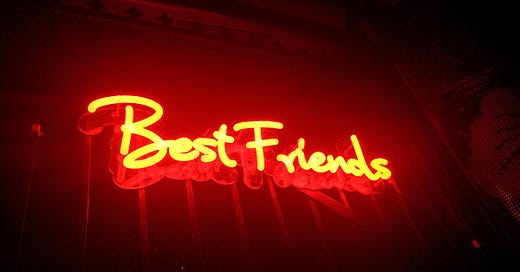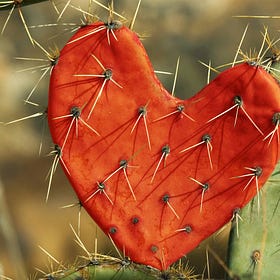Becoming Your Own Bestie with Monica Rivera
Monica Rivera used her grief to propel her exploration of herself, and found out she really enjoyed her own company
When Monica Rivera, a business coach and #BossLady, reached out to me to talk about being a childfree Latina, the excitement was off the charts! I love meeting new childfree people, especially Latinas, but when they come to me for the explicit reason of talking about this taboo topic, it lights me up!
It’s evidence that my work means something. That it’s working exactly as intended:
to help people see there’s no shame in taking the unconventional route through life
to provide a space where Latines feel comfortable opening up about their unique journeys
to build a community of people just like us
Not that I need the validation. But it’s a very human need to connect with other people, to build those bonds of friendship and community.
And after having a few beers with my own local community of childfree friends this past week, I’m reminded how important these connections, these bonds, are for our own well-being.
The stronger your support system is, the easier it is to get through life and thrive. But how do you do that—thrive, or even survive—when everyone you love and need is taken away from you?
The answer for Monica is in Part 1 of this condensed excerpt from our interview, which you can listen to or watch in full below.
The Flipside of Lonelineness
The title to Monica’s TEDx talk is The Flipside of Loneliness. In it she tells the story of losing her whole family, and how she had to become her own best friend.
Monica: At the end of 2019, I delivered this TEDx talk, and I always knew that I wanted to share my story about losing my family in this space. I didn't know how it was going to happen. I didn't know if it would fit the theme. I just knew that I would somehow be able to share this because I didn't really talk much about it.
There were people that had known me for a really long time, acquaintances that didn't know anything about my story. And I think it was because I was still healing from that. Think[ing] about how can I share this in a way that feels more empowering, that feels useful to people, and that doesn't feel as if I'm looking for pity, and that I don't pity myself anymore. Because for a while, to be honest, I really did.
To touch on very briefly, the day after I turned 16, I actually lost two childhood friends. They were both shot and killed together at an incident that had happened in the Bronx where I grew up.
And it was so painful because I hadn't experienced loss like that, and it was so close to home, and we were all around the same age. And little did I know that that was actually going to create a domino effect of what was to come.
Shortly after that, my grandmother passed away. She was my favorite person. I just loved my grandmother so much and that was devastating. It was devastating to lose her. She had just retired six months before and really had all these goals and dreams of everything she wanted to do that we talk about we're gonna do after we retire. And it was all snatched away from her.
Then six months after that, I lost my mom. And then it was just this domino effect of this tremendous loss over the course of the next seven years that was so devastating.
There's something about that age. Your brain hasn't fully formed yet when you're that young. So all of the connections that I was making were these really distorted connections of what adulthood meant, and [what] growing up meant, and survival. And all of these things that were so mixed up in this adolescent brain, it's hard enough to just be a teenage girl, let alone to experience all these things.
So I needed a lot of time to really process what healing meant for me, what my life was going to look like, and when I finally felt secure enough to tell that story. And so I finally did in 2019.
The Simple Answer for Handling Grief
Monica’s remedy for managing her grief was a simple answer to the question, “who am I outside of everything I’ve ever known?”
It’s a simple answer, but not an easy one to find. And in case you need additional help with the grief process, here’s some additional reading:
Grief-Prep: How to Actually "Pre-Grieve"
I learned last week that my 83-year-old Puerto Rican father has a DNR order. That stands for Do Not Resuscitate, which means if he were to slip into a coma or cease having meaningful life functions, he doesn’t want to remain alive by artificial means.
Monica: It was hard to share that because I thought it was so simplistic.
People are dealing with grief and it feels like this isn't the answer. When you're dealing with grief—even loneliness—it almost feels as if there has to be a bigger answer to the problem. But really, for me, I share about these three parts: exploring, and being curious, and becoming your own best friend.
And it took me a while to get there. I started living on my own when I was 16, so I had to figure out how I was going to pay bills and still go to school and work and all of these things that were happening simultaneously.
So I didn't really get a chance to figure out who I was, what did I like to do, what did I like to eat, what were my interests. I was almost always adopting what somebody else really liked to do because their situation was more important than mine. I’d taken on this chameleon-like persona to make other people feel comfortable.
Not having biological family feels so different. It's a loneliness that doesn't end because no one's coming back. I call it loneliness because it's not just about the grief.
I really did become my own best friend, and that was partially because I needed to. I had friends that I'd known my entire life, [who] would tell me “you're too sad to be around.”
And the thing is, I get it. When someone's 17, 18, 19 years old, it's like a very real thing, people don't know how to handle all that grief. I didn't know how to handle all that grief.
So even though I wasn't trying to be this sad person all the time, that was my energy, that was what was coming off of me. I realize now that there's probably a lot of responsibility that my friends felt to sort of buoy me, but at the time it was really painful to hear that.
So becoming my own best friend kind of became the thing.
Paulette: So what did that look like in practice?
Monica: It looked like getting up and traveling to all of the places I wanted to go to. So an example of that is, I had seen a commercial for the Rock and Roll Hall of Fame in Cleveland. It was summer, and I had some cash at this point, so I booked myself a hotel, and I drove to Cleveland the next day. And it was three days in Cleveland to spend time at the museum, I think I saw Phantom of the Opera on their version of Broadway, spent some time hanging out at the lake, and then drove home.
I had a friend's wedding, and then the next day I flew out to go to Arizona to spend time with the Grand Canyon. I drove along the coast of the Pacific Coast Highway in California.
I just started to really explore what life looked like beyond New York City and [the] Tri State, and really just said, “what am I like in these other places? Am I meeting friends? What does it look like to just experience these different things like hiking or yoga or just different modalities?”
I just tried everything to see what it was that I like to do. And what I found is I really like spending time with myself. I really have a good time on my own.
And that was a great thing as an only child. I used to think, “Oh, I want a brother. I want a sister.” But [being an only child] served me so well at the stage of my life. Just being someone who is imaginative and creative and independent really allowed me to do these things. I feel like my life kind of prepared me for that.
So I didn't really feel lonely. I felt really empowered and thought it was pretty cool to be able to try these things. My only thing is there are times where, of course, I wish I could have reported back to family and things like that. But I also realize, if there is a silver lining to something that's so tragic, it was being able to have these experiences that I don't know if I would have had otherwise.
I think I would have felt so indebted and maybe even co-dependent to my family and making sure that they were okay, that I don't know if I would have given myself the opportunity to live my life the way that I do now.
Paulette: That makes perfect sense. One of the key takeaways we have to put out there that grief looks so different for every individual. The way you managed your grief might not look like somebody else managing their grief. Obviously you came out the other side in the most positive way for you and you're still moving through life the way you want to.
Monica: Absolutely. When people have asked my thoughts on it in the past, “how to get over it or does time heal all?” I'm really honest.
It's a very individual process. There is no one day you arrive and you feel like, “oh, the grief is gone!”
It will pop up and it will reappear at different times and instances in your life. And sometimes it's really kind of riding next to you, shotgun with you, because those people are still there. They're still part of your life. They're just not physically here, but it does soften and the edges aren't quite as sharp.
And the memories that are good really start to reveal themselves in a way that it usurps the grief. And that's a really special part of it.
Part 2 of this portion of the interview is coming soon, and includes how Monica managed to navigate college with her ancestors looking down on her. If you’re impatient, check out the podcast episode below:
Listen or Watch this Interview
This podcast episode is called Grief Rides Shotgun: A Unique Journey through Loneliness with Monica Rivera (Part 1) and can be found in its entirety everywhere you listen to podcasts, like on Apple:
Or on Spotify:
And now on YouTube:
Like this post? Share with a friend and get on the leaderboard!
Support this publication by:






